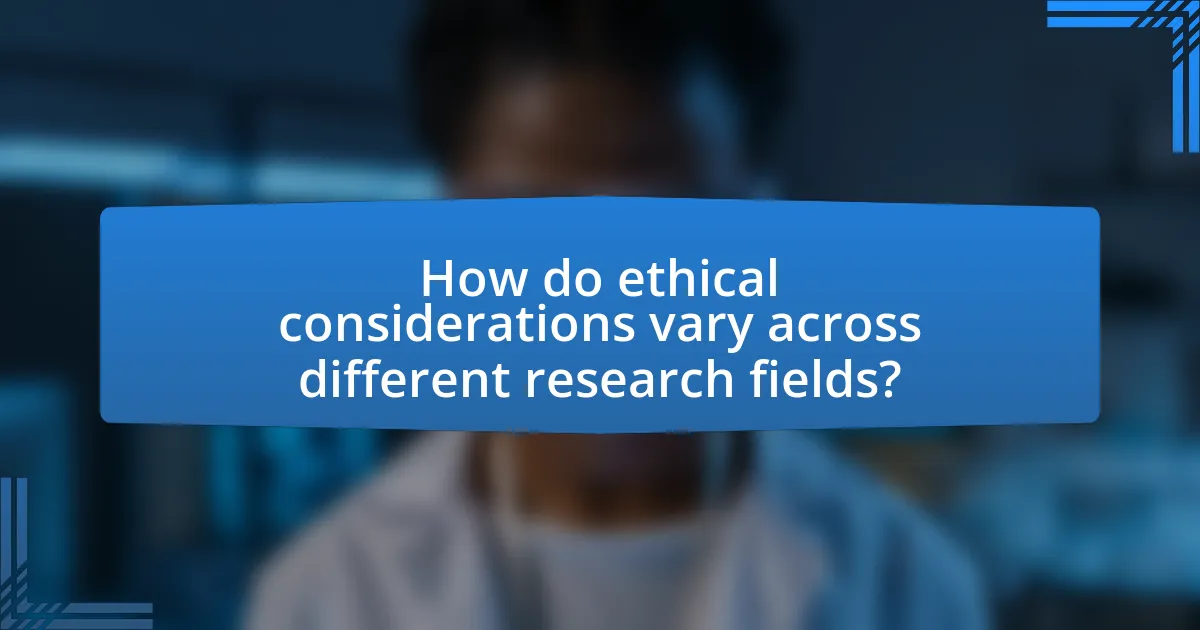Ethical considerations in research methodologies are essential principles that guide researchers in conducting studies with integrity and responsibility. Key ethical principles include informed consent, participant confidentiality, minimizing harm, and maintaining data integrity. The article outlines the importance of these ethical standards, the potential consequences of neglecting them, and the role of institutional review boards (IRBs) in ensuring compliance. It also discusses how ethical considerations vary across different research fields, the specific challenges faced in medical and social science research, and best practices for maintaining ethical integrity throughout the research process.

What are Ethical Considerations in Research Methodologies?
Ethical considerations in research methodologies involve principles that guide researchers to conduct studies responsibly and with integrity. These principles include informed consent, ensuring participant confidentiality, minimizing harm, and maintaining integrity in data collection and reporting. For instance, the Belmont Report outlines key ethical principles such as respect for persons, beneficence, and justice, which are foundational in human subjects research. Adhering to these ethical standards not only protects participants but also enhances the credibility and validity of the research findings.
Why are ethical considerations important in research?
Ethical considerations are important in research because they ensure the integrity of the research process and protect the rights and welfare of participants. By adhering to ethical guidelines, researchers minimize the risk of harm, promote trust, and enhance the credibility of their findings. For instance, the Declaration of Helsinki outlines principles for conducting medical research involving human subjects, emphasizing informed consent and the necessity of ethical review. This framework has been adopted globally, reinforcing the importance of ethical standards in maintaining public confidence in research outcomes.
What are the potential consequences of ignoring ethics in research?
Ignoring ethics in research can lead to severe consequences, including harm to participants, loss of credibility, and legal repercussions. When researchers fail to adhere to ethical standards, they risk causing physical or psychological harm to individuals involved in their studies, as evidenced by historical cases like the Tuskegee Syphilis Study, where participants were misled and denied treatment. Additionally, unethical practices can result in the invalidation of research findings, damaging the reputation of the researchers and their institutions, as seen in cases of data fabrication or plagiarism. Legal consequences may also arise, including lawsuits and penalties from regulatory bodies, which can further hinder future research opportunities. Overall, neglecting ethics undermines the integrity of the research process and can have far-reaching implications for society.
How do ethical considerations impact research credibility?
Ethical considerations significantly impact research credibility by ensuring the integrity and trustworthiness of the research process. When researchers adhere to ethical guidelines, such as obtaining informed consent and ensuring participant confidentiality, they enhance the reliability of their findings. For instance, studies that fail to address ethical concerns, like the infamous Tuskegee Syphilis Study, resulted in a loss of public trust and skepticism towards research outcomes. Ethical practices not only protect participants but also foster a culture of accountability, which is essential for the validation of research results. Thus, ethical considerations are fundamental in establishing and maintaining the credibility of research.
What are the key ethical principles in research methodologies?
The key ethical principles in research methodologies are respect for persons, beneficence, and justice. Respect for persons involves acknowledging autonomy and protecting those with diminished autonomy, ensuring informed consent is obtained. Beneficence requires researchers to maximize benefits and minimize harm to participants, as outlined in the Belmont Report. Justice emphasizes fairness in the distribution of research benefits and burdens, ensuring that no group is unfairly targeted or excluded. These principles are foundational in guiding ethical research practices and protecting participants’ rights and welfare.
What is informed consent and why is it crucial?
Informed consent is the process by which individuals voluntarily agree to participate in research after being fully informed about the study’s purpose, risks, benefits, and procedures. This process is crucial because it respects the autonomy of participants, ensuring they make knowledgeable decisions regarding their involvement. Ethical guidelines, such as those outlined in the Belmont Report, emphasize the importance of informed consent in protecting participants’ rights and welfare, thereby fostering trust in the research process and promoting ethical standards in research methodologies.
How does confidentiality protect research participants?
Confidentiality protects research participants by ensuring that their personal information and responses remain private and secure. This protection fosters trust between participants and researchers, encouraging honest and open communication, which is essential for the integrity of the research. According to the Belmont Report, maintaining confidentiality is a fundamental ethical principle that safeguards participants from potential harm, such as stigma or discrimination, that could arise from the disclosure of sensitive information. By implementing measures like anonymization and secure data storage, researchers can effectively uphold confidentiality, thereby enhancing the ethical standards of their studies.
What role do institutional review boards (IRBs) play in research ethics?
Institutional review boards (IRBs) serve a critical role in research ethics by ensuring the protection of human subjects involved in research studies. They review research proposals to assess ethical considerations, including informed consent, risk-benefit analysis, and the safeguarding of participants’ rights and welfare. IRBs are mandated by federal regulations in the United States, specifically the Common Rule, which requires that any research involving human subjects be reviewed and approved by an IRB before it can commence. This oversight helps to maintain ethical standards and promotes public trust in the research process.
How do IRBs evaluate research proposals for ethical compliance?
Institutional Review Boards (IRBs) evaluate research proposals for ethical compliance by assessing the potential risks and benefits to participants, ensuring informed consent processes are adequate, and verifying that the research adheres to ethical guidelines and regulations. They review the study’s design, participant recruitment methods, and data handling procedures to ensure that the rights and welfare of participants are protected. IRBs also consider the scientific validity of the research, as ethically sound research must be methodologically robust. This evaluation process is mandated by federal regulations, specifically the Common Rule (45 CFR 46), which outlines the requirements for IRB review and the protection of human subjects in research.
What are the common criteria used by IRBs in their assessments?
Institutional Review Boards (IRBs) commonly assess research proposals based on criteria such as risk-benefit analysis, informed consent, and the selection of subjects. Risk-benefit analysis evaluates whether the potential benefits of the research outweigh the risks to participants. Informed consent ensures that participants are fully aware of the study’s nature, risks, and their rights before agreeing to participate. The selection of subjects criterion examines whether participants are chosen fairly and equitably, avoiding exploitation of vulnerable populations. These criteria are essential for protecting the rights and welfare of research participants, as outlined in federal regulations and ethical guidelines.

How do ethical considerations vary across different research fields?
Ethical considerations vary significantly across different research fields due to the nature of the subjects involved and the potential impact of the research outcomes. In medical research, for instance, ethical guidelines prioritize informed consent and the minimization of harm to human subjects, as evidenced by the Declaration of Helsinki, which outlines ethical principles for medical research involving human subjects. In contrast, social science research often emphasizes confidentiality and the right to privacy, as highlighted by the American Psychological Association’s Ethical Principles of Psychologists and Code of Conduct, which stresses the importance of protecting participants’ identities. Furthermore, in fields like environmental research, ethical considerations may focus on the impact of research on ecosystems and communities, necessitating a balance between scientific inquiry and environmental stewardship. Thus, the ethical frameworks are tailored to address the specific risks and responsibilities inherent in each research discipline.
What ethical challenges are specific to medical research?
Ethical challenges specific to medical research include informed consent, risk-benefit analysis, and the potential for exploitation of vulnerable populations. Informed consent requires that participants fully understand the nature of the research, its risks, and their rights, which can be complicated by factors such as language barriers or cognitive impairments. Risk-benefit analysis involves ensuring that the potential benefits of the research outweigh the risks to participants, a determination that can be subjective and difficult to quantify. Additionally, vulnerable populations, such as children or economically disadvantaged individuals, may be at greater risk of exploitation, raising concerns about coercion and the fairness of their inclusion in studies. These challenges are underscored by historical instances, such as the Tuskegee Syphilis Study, which highlighted the consequences of ethical lapses in medical research.
How do ethical considerations differ in clinical trials compared to observational studies?
Ethical considerations in clinical trials differ significantly from those in observational studies primarily due to the level of intervention and risk involved. Clinical trials often require informed consent from participants, ensuring they understand potential risks and benefits, as they may be exposed to new treatments or interventions that could have unknown side effects. In contrast, observational studies typically involve monitoring existing behaviors or outcomes without intervention, which generally poses less risk to participants and may not require the same level of informed consent.
Furthermore, clinical trials are governed by strict regulatory frameworks, such as the Declaration of Helsinki, which mandates ethical oversight to protect participants, while observational studies may have more flexible ethical guidelines. For instance, the U.S. Department of Health and Human Services outlines specific requirements for Institutional Review Boards (IRBs) to review clinical trials, ensuring participant safety and ethical compliance, whereas observational studies may not always require IRB approval if they involve minimal risk. This distinction highlights the greater ethical scrutiny and responsibility placed on researchers conducting clinical trials compared to those conducting observational studies.
What are the ethical implications of using placebos in medical research?
The ethical implications of using placebos in medical research primarily revolve around issues of informed consent, deception, and the potential for harm. Informed consent requires that participants are fully aware of their involvement in a study, including the possibility of receiving a placebo instead of an active treatment. Deception occurs when participants are not informed that they may receive a placebo, which can undermine trust in the medical community. Additionally, the use of placebos raises concerns about the potential for harm if participants are denied effective treatment during the study. Research published in the Journal of Medical Ethics highlights these concerns, emphasizing the need for ethical guidelines that balance scientific rigor with the rights and well-being of participants.
What ethical issues are prevalent in social science research?
Ethical issues prevalent in social science research include informed consent, confidentiality, and the potential for harm to participants. Informed consent requires researchers to ensure that participants understand the nature of the study and voluntarily agree to participate, which is crucial for respecting autonomy. Confidentiality involves protecting the privacy of participants and ensuring that their data is not disclosed without permission, which is essential for maintaining trust. Additionally, researchers must consider the potential for psychological or social harm to participants, which can arise from sensitive topics or the misuse of data. These ethical considerations are guided by established principles such as those outlined in the American Psychological Association’s Ethical Principles of Psychologists and Code of Conduct, which emphasizes the importance of safeguarding participant welfare and rights.
How does the concept of power dynamics affect ethical considerations in social research?
The concept of power dynamics significantly influences ethical considerations in social research by shaping the relationships between researchers and participants. Power imbalances can lead to exploitation, coercion, or manipulation, which raises ethical concerns regarding informed consent and the autonomy of participants. For instance, researchers may hold more authority or resources, potentially pressuring participants into unfavorable conditions or decisions. Ethical guidelines, such as those established by the American Psychological Association, emphasize the need for equitable treatment and respect for participants’ rights, highlighting the importance of recognizing and addressing these power dynamics to ensure ethical integrity in research practices.
What are the ethical dilemmas related to participant observation?
Participant observation presents several ethical dilemmas, primarily concerning informed consent, privacy, and potential harm to participants. Researchers often face challenges in obtaining explicit consent from individuals being observed, especially in natural settings where participants may not be aware of the research. This lack of awareness raises ethical concerns about the right to privacy, as individuals may not wish to have their behaviors documented or analyzed. Additionally, participant observation can inadvertently lead to harm, either by misrepresenting the observed group or by influencing the behavior of participants due to the researcher’s presence. These dilemmas necessitate careful consideration and adherence to ethical guidelines to protect the rights and well-being of participants.

What are the best practices for ensuring ethical research methodologies?
The best practices for ensuring ethical research methodologies include obtaining informed consent, ensuring confidentiality, and minimizing harm to participants. Informed consent requires researchers to provide clear information about the study’s purpose, procedures, risks, and benefits, allowing participants to make an educated decision about their involvement. Ensuring confidentiality involves protecting participants’ personal information and data, which fosters trust and encourages participation. Minimizing harm entails designing studies that avoid physical, psychological, or emotional distress, adhering to the principle of beneficence. These practices are supported by ethical guidelines from organizations such as the American Psychological Association and the Belmont Report, which emphasize respect for persons, beneficence, and justice in research.
How can researchers effectively obtain informed consent?
Researchers can effectively obtain informed consent by providing clear, comprehensive information about the study, including its purpose, procedures, risks, and benefits. This process involves using plain language to ensure participants fully understand what they are agreeing to, which is essential for ethical research practices. According to the Belmont Report, informed consent is a fundamental ethical principle that emphasizes respect for persons, requiring that individuals are given adequate information to make voluntary decisions regarding their participation. Additionally, researchers should allow participants to ask questions and provide ample time for them to consider their involvement, reinforcing the importance of autonomy in the consent process.
What strategies can be employed to ensure participants fully understand their rights?
To ensure participants fully understand their rights, researchers can employ strategies such as providing clear, concise information sheets and conducting verbal briefings. Information sheets should outline participants’ rights in straightforward language, avoiding jargon, and should be distributed prior to participation. Verbal briefings allow researchers to explain rights directly, answer questions, and clarify any misunderstandings. Research indicates that participants who receive both written and verbal information are more likely to comprehend their rights effectively, as demonstrated in studies on informed consent processes.
How can researchers maintain transparency throughout the research process?
Researchers can maintain transparency throughout the research process by clearly documenting their methodologies, data collection procedures, and analysis techniques. This documentation allows for reproducibility and enables other researchers to verify findings. For instance, the American Psychological Association emphasizes the importance of sharing research protocols and data sets to enhance transparency. Additionally, researchers should disclose any conflicts of interest and funding sources, as highlighted in the guidelines from the Committee on Publication Ethics, which state that transparency in these areas fosters trust and integrity in research.
What are the common pitfalls to avoid in ethical research?
Common pitfalls to avoid in ethical research include inadequate informed consent, lack of transparency, and failure to ensure participant confidentiality. Inadequate informed consent occurs when researchers do not fully inform participants about the nature, risks, and benefits of the study, which can lead to ethical violations. Lack of transparency can manifest as withholding information about the research process or results, undermining trust and accountability. Failure to ensure participant confidentiality can result in the unauthorized disclosure of sensitive information, violating ethical standards and potentially harming participants. These pitfalls are critical to address, as they can compromise the integrity of the research and the welfare of participants.
How can researchers prevent coercion in participant recruitment?
Researchers can prevent coercion in participant recruitment by ensuring that participation is voluntary and that potential participants are fully informed about the study. This can be achieved by providing clear, comprehensive information about the study’s purpose, procedures, risks, and benefits, allowing individuals to make an informed decision without pressure. Additionally, researchers should implement measures such as using neutral language in recruitment materials, avoiding undue influence from authority figures, and ensuring that participants understand they can withdraw at any time without penalty. These practices align with ethical guidelines established by organizations such as the American Psychological Association, which emphasize the importance of voluntary participation and informed consent in research.
What measures can be taken to avoid conflicts of interest?
To avoid conflicts of interest, organizations should implement clear policies that require full disclosure of any potential conflicts by employees and stakeholders. These policies should mandate regular training on ethical standards and the importance of transparency in decision-making processes. Additionally, establishing independent review boards can help assess and manage potential conflicts, ensuring that decisions are made based on merit rather than personal interests. Research indicates that organizations with robust conflict of interest policies experience fewer ethical breaches, as seen in studies conducted by the American Psychological Association, which highlight the effectiveness of transparency in maintaining integrity in research methodologies.
What resources are available for researchers to enhance their understanding of research ethics?
Researchers can enhance their understanding of research ethics through various resources, including institutional review board (IRB) guidelines, online courses, and professional organizations. IRB guidelines provide specific ethical standards and procedures for conducting research involving human subjects, ensuring compliance with ethical norms. Online platforms like Coursera and edX offer courses on research ethics, often developed by reputable universities, which cover essential topics such as informed consent and data integrity. Additionally, professional organizations like the American Psychological Association and the Association of American Medical Colleges provide extensive resources, including publications and workshops, that focus on ethical practices in research. These resources collectively support researchers in navigating the complexities of ethical considerations in their work.
Where can researchers find guidelines and frameworks for ethical research practices?
Researchers can find guidelines and frameworks for ethical research practices through various reputable sources. Prominent organizations such as the American Psychological Association (APA) and the World Health Organization (WHO) provide comprehensive ethical guidelines tailored for specific fields. For instance, the APA’s “Ethical Principles of Psychologists and Code of Conduct” outlines standards for ethical behavior in psychological research. Additionally, the Belmont Report, published by the U.S. Department of Health and Human Services, establishes foundational ethical principles for research involving human subjects, emphasizing respect, beneficence, and justice. These documents serve as essential references for researchers seeking to adhere to ethical standards in their work.
How can professional organizations support ethical research methodologies?
Professional organizations can support ethical research methodologies by establishing clear ethical guidelines and providing resources for researchers. These organizations often create codes of conduct that outline ethical standards, ensuring researchers understand their responsibilities regarding integrity, transparency, and respect for participants. For instance, the American Psychological Association has developed a comprehensive Ethical Principles of Psychologists and Code of Conduct, which serves as a framework for ethical decision-making in research. Additionally, professional organizations can offer training programs and workshops that educate researchers on ethical practices, thereby promoting adherence to these standards. By facilitating discussions on ethical dilemmas and providing platforms for sharing best practices, these organizations reinforce the importance of ethical considerations in research methodologies.


